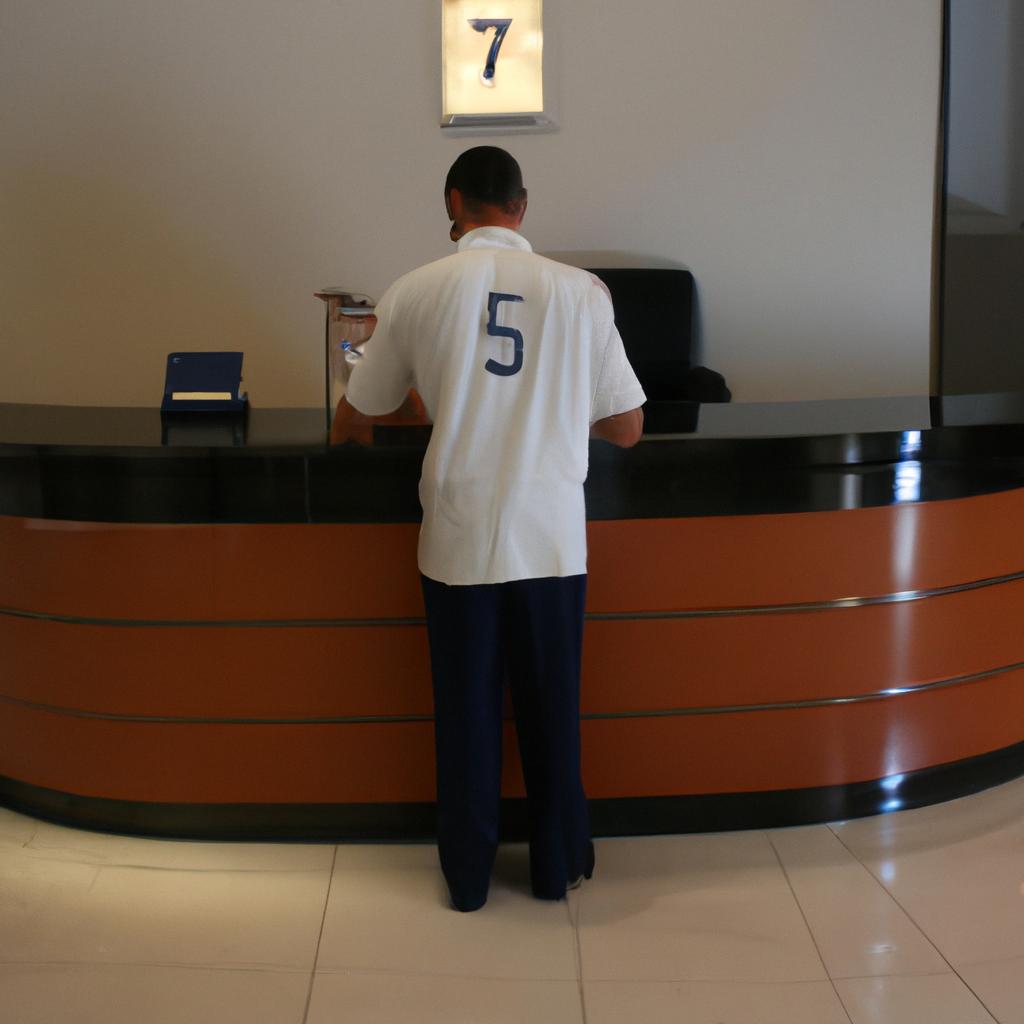In today’s fast-paced world, where travel has become an integral part of our lives, finding suitable accommodation can often be a daunting task. Whether you are planning a business trip or a leisurely getaway, ensuring room availability at your desired hotel is crucial. This article aims to provide a comprehensive guide to hotel reservations, offering practical advice and insights on how to navigate the booking process effectively.
Consider this scenario: Sarah, a seasoned traveler, plans to visit a bustling city for an important conference. She meticulously researches hotels in the area that offer convenient access to the conference venue and meet her budgetary constraints. However, upon contacting several hotels, she discovers that most of them have limited room availability during her intended stay dates. Frustrated by this setback, Sarah realizes the importance of understanding the factors influencing room availability and developing strategies to secure accommodations in advance.
By delving into various aspects such as peak seasons, cancellation policies, and different reservation methods, readers will gain valuable knowledge on making informed decisions regarding their hotel bookings. In addition to providing general guidelines, this article also highlights specific considerations for both individual travelers and those organizing group reservations. Through exploring these topics comprehensively within an academic framework, readers will be equipped with essential tools necessary for navigating the world of hotel reservations with confidence and ease.
One of the key factors that can greatly impact room availability is the concept of peak seasons. Understanding when a particular destination experiences high tourist influx can help travelers plan their trips accordingly. During peak seasons, hotels tend to have limited room availability due to high demand. It is advisable for travelers to book their accommodations well in advance during these periods to secure a room.
Another important consideration is the cancellation policy of the hotel. Different hotels have different policies regarding cancellations and refunds. It is crucial for travelers to carefully read and understand these policies before making a reservation. Some hotels may have strict cancellation policies where no refunds are provided, while others may offer more flexible options. By being aware of these policies, travelers can make informed decisions based on their own circumstances.
When it comes to reservation methods, there are several options available to travelers. Online booking platforms have gained popularity in recent years, offering convenience and a wide range of choices. These platforms allow users to compare prices, read reviews, and make reservations from the comfort of their own homes. However, some travelers may prefer traditional methods such as contacting hotels directly or using travel agents. Each method has its own advantages and disadvantages, and it ultimately depends on individual preferences.
Individual travelers and those organizing group reservations also have specific considerations to keep in mind. For individual travelers, factors such as room types, amenities, and proximity to attractions or transportation hubs may play a significant role in their decision-making process. On the other hand, group reservations require careful coordination and communication with the hotel staff to ensure all members are accommodated efficiently.
In conclusion, understanding the factors influencing room availability and developing effective strategies for hotel reservations is essential for today’s travelers. By considering aspects such as peak seasons, cancellation policies, reservation methods, and specific considerations for individual or group bookings, travelers can navigate this process successfully and secure suitable accommodations for their upcoming trips. With proper planning and research, the daunting task of finding suitable accommodation can be turned into a seamless experience, allowing travelers to focus on enjoying their travel experiences to the fullest.
Understanding Room Availability
Imagine you are planning a vacation to a popular tourist destination. You have carefully chosen your travel dates and excitedly start browsing hotel options online. However, as you begin making reservations, you notice that many hotels are already fully booked for the duration of your trip. This scenario highlights the importance of understanding room availability when it comes to hotel reservations.
To grasp the concept of room availability, it is essential to acknowledge that hotels operate on a limited inventory basis. Simply put, there are only a certain number of rooms available at any given time for guests to book. The actual number of available rooms can fluctuate due to various factors, such as seasonal demand, special events, or even unforeseen circumstances like maintenance issues or renovations.
One way to evaluate room availability in an objective manner is through statistical analysis. By examining historical data and trends within the hospitality industry, experts can make predictions about future occupancy rates and adjust pricing accordingly. For instance, during peak season periods like summer holidays or festive seasons, hotels may experience high demand and subsequently raise their prices to maximize revenue.
Understanding the dynamics of room availability involves considering multiple factors simultaneously. Here are some key points:
- Peak vs Off-Peak Periods: Hotels often categorize their operating seasons into peak and off-peak periods based on demand levels.
- Booking Lead Time: The amount of time between booking a reservation and the actual stay impacts room availability.
- Cancellation Policies: Hotel policies regarding cancellations affect whether canceled rooms become available again for new bookings.
- Overbooking Practices: Some hotels intentionally overbook their rooms by relying on guest cancellations or no-shows to ensure maximum occupancy.
By analyzing these factors collectively, potential travelers gain insight into how they can navigate the process of securing suitable accommodations amidst varying levels of room availability.
Factors Affecting Room Availability
In the previous section, we explored the concept of room availability in hotels. Now, let us delve deeper into the various factors that can affect room availability and how hotel reservations are managed to ensure a seamless experience for guests.
Imagine a scenario where an international conference is being held in a bustling metropolis. Attendees from all around the world gather at this event, creating a surge in demand for hotel accommodations. As a result, many hotels will inevitably face challenges in meeting the high volume of reservation requests during this period. This example highlights one prime factor affecting room availability – peak seasons or special events that attract large crowds.
To better understand how hotels manage their room inventory amidst varying demands, let’s examine some key considerations:
-
Occupancy Rates: Hotels closely monitor occupancy rates which reflect the percentage of rooms occupied at any given time. By analyzing historical data and forecasting future trends, hotel management can make informed decisions regarding pricing and allocation of available rooms.
-
Reservation Policies: Each hotel has its own set of policies governing reservations. These may include minimum stay requirements, cancellation fees, or even restrictions on booking certain types of rooms during busy periods. These policies help hotels optimize their resources while providing flexibility to their guests.
-
Room Allocation Systems: To efficiently manage room availability, most hotels utilize advanced computer systems integrated with online booking platforms. Through these systems, they can allocate specific numbers and types of rooms based on real-time updates received from various channels.
-
Revenue Management Strategies: Hotels employ revenue management strategies to maximize profit by offering dynamic pricing based on market conditions and demand fluctuations. By adjusting prices according to supply and demand patterns, hotels aim to achieve optimal revenue generation while ensuring guest satisfaction.
Now equipped with an understanding of the factors affecting room availability in hotels, we can move forward to explore valuable tips for finding available rooms during peak times or when attending popular events without disappointment or having to compromise on quality accommodation.
Tips for Finding Available Rooms
In the previous section, we explored various factors that can affect room availability in hotels. Now, let’s delve deeper into these factors and understand their impact on finding a suitable accommodation.
To illustrate this further, consider the case of a business traveler visiting a popular tourist destination during peak season. The combination of high demand from both leisure travelers and other business professionals attending conferences or events makes it challenging to secure a room at short notice. This scenario highlights how multiple factors can contribute to limited room availability.
Factors affecting room availability:
-
Seasonal Demand:
- During peak seasons such as summer vacations or holiday periods, hotel rooms are often in high demand.
- Tourist attractions and special events draw large crowds, making it harder to find available rooms.
-
Location:
- Hotels located near major transportation hubs like airports or train stations tend to fill up quickly due to convenience for travelers.
- Popular city centers or areas close to prominent tourist sites also experience increased demand.
-
Hotel Capacity:
- Limited number of rooms within a hotel directly affects its overall availability.
- Smaller boutique hotels may have fewer accommodations compared to larger chain hotels.
-
Reservation Policies:
- Some hotels implement strict cancellation policies where reserved rooms cannot be released until closer to the check-in date.
- Non-refundable booking options may limit flexibility for guests seeking alternative arrangements.
Understanding these factors is crucial when planning your trip and searching for available rooms. By being aware of potential challenges, you can better manage your expectations and develop strategies that increase your chances of securing suitable accommodations during busy periods.
Next, we will explore tips and strategies for finding available rooms in situations where room availability is scarce – particularly useful during busy travel seasons or when faced with last-minute plans. So let’s move ahead and discover effective booking strategies for handling such scenarios without compromising on quality or convenience.
Booking Strategies for Busy Periods
Having learned some valuable tips on finding available rooms, it is now essential to explore effective booking strategies during busy periods. To illustrate the importance of these strategies, consider a hypothetical scenario where you plan a weekend getaway in a popular tourist destination. Despite your excitement, you quickly discover that most hotels are fully booked due to an upcoming music festival. However, armed with the right knowledge and approach, there are still ways to secure accommodations even during such high-demand periods.
Booking Strategies for Busy Periods:
-
Flexibility:
- Consider adjusting your travel dates by arriving earlier or departing later than initially planned.
- Be open to exploring alternative nearby locations if availability is limited at your preferred destination.
- Look into mid-week stays as they tend to be less crowded compared to weekends.
-
Early Planning:
- Begin researching and making reservations well in advance, especially for peak seasons or major events.
- Utilize hotel websites or online travel agencies (OTAs) that provide real-time updates on room availability.
- Subscribe to newsletters or follow social media accounts of hotels and OTAs for exclusive promotions and early access to bookings.
-
Direct Communication:
- Contact hotels directly through phone calls or emails rather than relying solely on online platforms.
- Speak with hotel staff who may have more information about cancellations or can recommend alternatives within their network.
-
Loyalty Programs:
- Join loyalty programs offered by hotels or chains that grant members priority access to room reservations and special offers.
- Accumulate points from previous stays to redeem rewards such as room upgrades or discounts during high-demand periods.
Emotional Bulleted List:
- Frustration when encountering limited room availability during desired travel dates
- Anxiety caused by the fear of not being able to secure accommodations
- Disappointment resulting from missed opportunities due to delayed or last-minute booking attempts
- Relief and satisfaction when successfully securing a room during busy periods
Table: Factors Influencing Room Availability
| Factor | Impact on Availability |
|---|---|
| Major events | Limited availability |
| Peak travel seasons | High demand |
| School holidays | Increased occupancy |
| Local festivals | Reduced vacancies |
Understanding these strategies and factors that influence room availability will greatly enhance your chances of securing suitable accommodations. In the subsequent section, we will delve into making changes to booked rooms, providing you with valuable insights for any necessary modifications without causing inconvenience.
Making Changes to Booked Rooms
Imagine this scenario: You have just arrived in a new city, tired from your journey and desperately in need of a place to rest. However, all the hotels seem fully booked due to a major event taking place in town. What can you do in such a situation? This section will explore strategies for making last-minute hotel reservations during busy periods.
When faced with limited room availability, there are several approaches you can take to increase your chances of finding suitable accommodation:
-
Expand Your Search Area:
- Consider looking beyond the popular tourist areas or downtown districts.
- Explore nearby neighborhoods that may offer more options at reasonable prices.
- Utilize online travel platforms that allow you to search for accommodations based on specific criteria such as distance, price range, and amenities.
-
Be Flexible with Dates:
- Check if adjusting your arrival or departure dates by a day or two could open up more room availability.
- Avoid peak check-in days like Fridays and Saturdays when many travelers arrive for weekend getaways.
-
Contact Hotels Directly:
- Don’t solely rely on third-party booking websites; call hotels directly to inquire about any last-minute cancellations or unlisted deals they might have available.
- Building rapport with the front desk staff may also improve your chances of securing a room even during peak periods.
-
Consider Alternative Accommodations:
- Look into alternative lodging options such as guesthouses, hostels, bed and breakfasts, or vacation rentals which may still have availability when traditional hotels are fully booked.
- Keep an eye out for unique local experiences offered through homestays or community-based tourism initiatives.
To illustrate the importance of these strategies, let’s examine the following table showcasing different scenarios encountered by travelers seeking last-minute hotel reservations during peak seasons:
| Scenario | Availability | Emotional Response |
|---|---|---|
| Couple needing a romantic getaway | Limited options, potentially high prices | Frustration |
| Business traveler attending a conference | Close to no availability, inflated rates | Stress |
| Family vacation during school holidays | Difficulty finding suitable accommodations | Disappointment |
| Solo backpacker seeking affordable lodging | Few affordable options, potential compromise on quality | Anxiety |
By employing these strategies and considering alternative options, you can increase your chances of securing accommodation even during busy periods. As the next section will discuss ensuring a smooth check-in process at hotels, it is essential to plan ahead and be prepared for any situation that may arise upon arrival.
Now that we have explored strategies for making last-minute hotel reservations during busy periods, let’s shift our focus to ensuring a smooth check-in process.
Ensuring a Smooth Check-in Process
Building upon the process of making changes to booked rooms, it is crucial for hotels to ensure a smooth check-in experience for guests. This section will provide valuable insights on how hotels can optimize their check-in procedures and create a positive first impression.
Example Scenario:
Imagine arriving at a hotel after a long journey only to encounter delays and confusion during the check-in process. The frustration mounts as you wait in line, unsure if your room is ready or if any special requests have been acknowledged. Such instances highlight the importance of streamlining check-ins within hotels.
To enhance the guest experience and minimize potential issues, consider implementing the following strategies:
- Streamlined Check-In Stations:
- Increase the number of available staff members at peak times.
- Utilize technology such as self-check-in kiosks to expedite the process.
- Ensure clear signage directing guests towards designated check-in areas.
- Provide ample seating arrangements for waiting guests.
Table: Common Guest Requests During Check-In
| Request | Emotional Response |
|---|---|
| Early check-in | Relief |
| Late check-out | Convenience |
| Upgrade | Delight |
| Specific room location (e.g., high floor) | Satisfaction |
3-Column Table Example:
| Strategy | Benefits | Implementation Tips |
|---|---|---|
| Increase staffing | Faster processing time | Regularly assess peak hours |
| Self-check-in kiosks | Reduced wait times | Clearly instruct guests on usage |
| Clear signage | Enhanced navigability | Use consistent visual cues |
| Ample seating arrangements | Improved comfort | Optimize space allocation |
By implementing these strategies, hotels can create a positive and efficient check-in experience for their guests. This not only improves guest satisfaction but also sets the tone for an enjoyable stay.
In summary, ensuring a smooth check-in process is crucial to maintaining high levels of guest satisfaction in hotels. With streamlined check-in stations, technology integration, clear signage, and comfortable waiting areas, hotels can enhance the overall check-in experience for their guests. Taking these steps will contribute to creating a positive first impression and promoting a seamless stay throughout their visit.
 Cedars Inn Auburn
Cedars Inn Auburn



